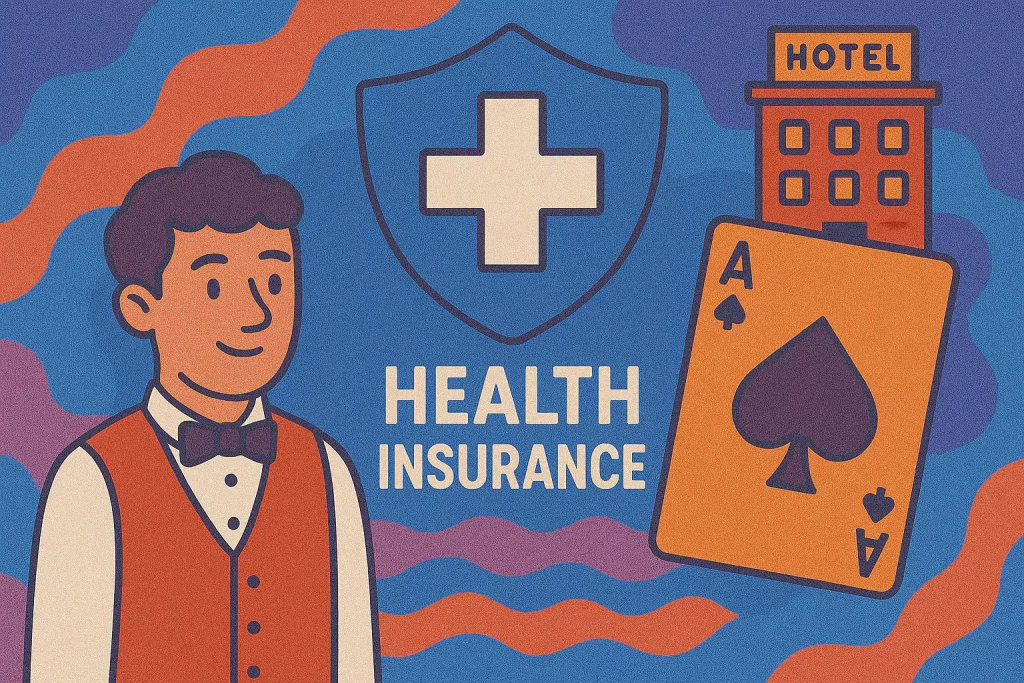
Complete Health Insurance Guide for Las Vegas Casino and Hospitality Workers
Health insurance for casino dealers in Las Vegas costs $350-600 monthly through Nevada Health Link marketplace plans versus $0-150 monthly through Culinary Union coverage, creating massive savings disparities between union and non-union workers. The coverage gap becomes critical as 40% of Las Vegas hospitality workers operate part-time or on-call schedules that disqualify them from employer-sponsored benefits, leaving 120,000+ workers navigating individual markets. This is where private and commerical plans have helped numerous clients of mine secure affordable PPO coverage with lower deductibles and copays! Private insurance plans are 100% customizable providing corporate-like style benefits.
Culinary Union Health Insurance vs Non-Union Las Vegas: The Real Cost Difference
Culinary Union Local 226 provides comprehensive health coverage costing members $0-30 monthly for family plans through the Culinary Health Fund, while non-union casino workers pay $400-800 monthly for equivalent marketplace coverage. The union plan eliminates deductibles entirely and caps specialist copays at $20, compared to $3,000-6,000 deductibles and $50-80 specialist visits in standard individual policies. Nevada’s health insurance marketplace doesn’t offer PPO plans, leaving many residents searching for better options. That’s where private and commercial insurance makes a difference. I’ve helped countless clients access affordable PPO coverage with lower deductibles, reduced copays, and fully customizable benefits that rival corporate health plans—all at competitive prices.
Union Coverage Breakdown: Union members working 120+ hours monthly qualify for zero-premium health insurance covering medical, dental, vision, and prescription drugs without annual deductibles. The Culinary Health Fund operates as self-insured group coverage funded by employer contributions of $6.50-8.00 per hour worked, creating benefit values exceeding $15,000 annually per worker.
Non-Union Alternative Costs: Non-union casino dealers earning $50,000 or more annually do NOT qualify for tax credits through Nevada Health Link, reducing Silver plan costs from $450-550 to $300-400 monthly. Without subsidies, equivalent coverage requires $450-650 monthly premiums plus $4,000-9,000 deductibles before insurance activates. Private and commercial insurance plans offer Nevada residents access to affordable PPO coverage—something unavailable through the Nevada health insurance marketplace. My clients benefit from customizable plans with lower deductibles and copays, plus corporate-style benefits tailored to their needs.
Health Insurance for Part-Time Bartenders Las Vegas: The 30-Hour Threshold Problem
Part-time bartenders working 25-29 hours weekly fall below the 30-hour ACA threshold requiring employer coverage, forcing reliance on individual policies despite earning $30,000-45,000 annually including tips. Las Vegas casinos strategically schedule part-time workers at 28-29 hours to avoid benefit obligations, creating coverage gaps for approximately 50,000 hospitality employees.
Marketplace Subsidy Calculation: Bartenders earning $32,000 annually ($2,667 monthly) qualify for premium tax credits reducing Silver plan costs by $200-300 monthly, lowering total premiums to $150-250 monthly. Cost-sharing reductions further decrease deductibles from $6,000 to $1,000-2,000 for workers earning under 400% federal poverty level ($37,650 individuals in 2025).
Private or Commercial Coverage Is the most cost effective that provides PPO corporate style benefits based on your health and available at anytime throughout the year.
Off-Strip Casino Coverage: Smaller casinos off the Las Vegas Strip rarely offer health benefits to any employees, requiring workers at properties like Palace Station, Boulder Station, and locals casinos to secure individual coverage through private/commercial,Nevada Health Link or remain uninsured.
Las Vegas Hospitality Worker Insurance Between Jobs: COBRA Alternatives
Las Vegas hospitality worker insurance between jobs requires immediate action within 60 days of employment termination to avoid coverage gaps and potential medical debt from uninsured emergencies. COBRA continuation costs sky rockect for family coverage, making private and commercial insurance plans superior financial choices for most transitioning workers
Special Enrollment Period Activation: Job loss triggers 60-day special enrollment periods allowing immediate Nevada Health Link marketplace enrollment without waiting for annual open enrollment. Coverage begins the first day of the month following application submission, creating potential 2-4 week gaps requiring short-term medical insurance bridges costing $100-300 monthly. Private/commercial PPO corporate style benefits at affordable rates are also available right away throughout the year!
Union Member Transition Strategy: Culinary Union members losing employment maintain coverage for 2-3 months after insufficient hours based on previous quarterly banking, then transition to COBRA, marketplace plans, or private/commercial. The critical timing window requires marketplace applications during the final month of union coverage to prevent gaps. Private/commercial PPO corporate style benefits at affordable rates are also available right away throughout the year!
Income Reporting for Subsidies: Transitioning workers should project annual income based on expected new employment rather than prior year earnings, as premium tax credits calculate from current-year income estimates. Unemployed workers earning $0-$20,783 annually (138% FPL) qualify for Nevada Medicaid rather than marketplace subsidies. If you’re looking for corporate style PPO options that have nothing to do with your income, you have the private/commercial options as well!
Health Insurance for On-Call Casino Workers Las Vegas: Variable Hour Coverage Strategies
On-call casino workers Las Vegas face monthly eligibility fluctuations as variable hours swing between 80-150 hours, creating scenarios where employer coverage activates and terminates repeatedly throughout the year. This employment structure affects approximately 15,000 Las Vegas casino workers in banquets, convention services, and event staffing roles. Private/commercial PPO insurance provides you your own corporate style benefits at affordable rates, so you don’t have to deal with gaps!
Monthly Hour Threshold Management: Casinos measure full-time status using 130-hour monthly averages over 3-12 month measurement periods, meaning on-call workers may qualify for benefits during busy convention seasons (September-May) but lose eligibility during summer slowdowns. The coverage churn creates administrative nightmares and potential coverage gaps during eligibility transitions.
Individual Policy Stability Advantage: Maintaining year-round individual policies through Nevada Health Link provides coverage stability regardless of monthly hour fluctuations, with premium tax credits adjusting automatically based on actual annual income. Workers earning $35,000-50,000 annually pay $250-400 monthly for Silver plans offering superior stability compared to employer coverage volatility.
Dual Coverage Coordination: Strategic workers maintain marketplace plans year-round while accepting employer coverage during qualification periods, allowing employer plans to pay primary claims while marketplace coverage provides backup during employer coverage gaps. This approach costs $150-250 extra monthly but eliminates coverage interruptions.
Nevada Health Link Marketplace Options for Casino Workers
Nevada Health Link marketplace plans offer three strategic tiers for Las Vegas hospitality workers balancing premium costs against healthcare usage expectations and income-based subsidy eligibility.
Bronze Plans for Healthy Workers: Casino dealers and bartenders requiring only preventive care and occasional urgent care visits benefit from Bronze plans costing $200-350 monthly with subsidies, featuring $8,000 deductibles but protecting against catastrophic expenses. Annual costs typically total $2,400-4,200 including premiums and minor care expenses.
Silver Plans for Moderate Users: Workers requiring regular prescriptions or specialist visits should select Silver plans costing $300-450 monthly with subsidies, providing $4,000-6,000 deductibles and cost-sharing reductions for lower earners. The enhanced benefits justify higher premiums when annual healthcare expenses exceed $3,000-5,000.
Gold Plans for High Healthcare Needs: Hospitality workers with chronic conditions like diabetes, asthma, or requiring ongoing specialist care maximize value through Gold plans costing $400-550 monthly with subsidies, featuring $1,000-3,000 deductibles and 80-90% coverage after deductible satisfaction.
Strip vs Off-Strip Employment Insurance Differences
Strip casino employees at MGM Resorts, Caesars Entertainment, and Wynn Resorts properties receive group policies requiring 30+ weekly hours for eligibility, while off-strip locals casinos rarely offer health benefits regardless of hours worked. This geographic disparity creates two-tier healthcare access across Las Vegas’s 175,000 gaming employees.
Strip Casino Benefits Timeline: Major Strip properties provide health insurance eligibility after 90-day waiting periods for full-time employees, with coverage activating the first month following probation completion. Part-time employees working 30-35 hours receive reduced benefit packages or higher premium contributions averaging $150-250 monthly.
Off-Strip Coverage Reality: Locals casinos including Station Casinos properties, Boyd Gaming locations, and independent casinos offer minimal health benefits, with many providing only workers’ compensation coverage required by Nevada law. Workers at these properties comprise 45% of Las Vegas casino employees yet represent 65% of hospitality workers using marketplace plans.
Tipped Employee Income Calculation for Subsidies
Tipped employee income calculation for marketplace subsidies requires accurate annual income projections combining base wages plus expected tips, as premium tax credits calculate from modified adjusted gross income including all compensation. Las Vegas bartenders and cocktail servers earning $45,000-65,000 annually often miscalculate eligibility by omitting tip income.
Proper Income Reporting: Report annual income as base hourly wage ($15-18/hour) times expected hours (1,500-2,080 annually) plus average monthly tips ($2,000-4,000) times 12 months. Bartenders earning $18/hour plus $2,500 monthly tips project $57,600 annual income, disqualifying them from subsidies above 400% FPL ($62,400 individuals 2025).
Year-End Reconciliation Risk: Underreporting income to maximize subsidies creates tax repayment obligations when filing annual returns, with workers potentially owing $2,000-8,000 in excess premium tax credits. Conservative income estimates prevent surprise tax bills while maintaining appropriate subsidy eligibility.
Emergency Coverage for Uninsured Hospitality Workers
Emergency coverage for uninsured hospitality workers creates financial catastrophes as single emergency room visits at Las Vegas hospitals cost $1,500-4,000 for minor issues and $10,000-50,000 for serious conditions requiring admission. University Medical Center, Valley Hospital, and Sunrise Hospital emergency departments treat 180,000+ uninsured patients annually with average bills exceeding $8,500.
Hospital Financial Assistance: Las Vegas hospitals offer charity care programs reducing bills by 50-100% for workers earning under 300% FPL ($45,000 individuals), requiring applications within 30-90 days of service. Uninsured workers should immediately request financial assistance applications before bills enter collections.
Urgent Care Alternatives: Minor emergencies cost $100-250 at urgent care clinics versus $1,500-3,000 at emergency rooms, making urgent care strategic for non-life-threatening conditions. Las Vegas operates 60+ urgent care locations offering cash-pay discounts and payment plans absent in hospital emergency departments.
Understanding health insurance options empowers Las Vegas casino and hospitality workers to secure coverage matching their employment status, income level, and healthcare needs. Whether comparing individual policies through Nevada Health Link against union coverage or navigating part-time work coverage gaps, strategic planning prevents financial disasters while maintaining healthcare access in America’s hospitality capital.
EXCELLENTTrustindex verifies that the original source of the review is Google. Jenn is very helpful and made everything easy to understand!Posted onTrustindex verifies that the original source of the review is Google. Call her today! Saved me a lot of money switching insurances and so kind and friendly.Posted onTrustindex verifies that the original source of the review is Google. Jenn was very helpful when looking for a plan and understanding with working around my busy schedule. I really appreciate all that she has done for me!!Posted onTrustindex verifies that the original source of the review is Google. Jenn was a great help in getting the best coverage at an affordable rate. I would highly recommend giving Jenn a call. Steve ManleyPosted onTrustindex verifies that the original source of the review is Google. I appreciate your diligence and persistence to your craft. You are knowledgeable and willing to share it at no cost. That is huge especially in the climate we are currently in. Thank you !!!! I enjoy receiving your emails and will pass on your information.Posted onTrustindex verifies that the original source of the review is Google. She is so kind and easy to work with. She really cares and puts a lot of thought into helping her clients.Verified by TrustindexTrustindex verified badge is the Universal Symbol of Trust. Only the greatest companies can get the verified badge who has a review score above 4.5, based on customer reviews over the past 12 months. Read more
Learn More
Ready to secure optimal health coverage?
Contact Integrity Health Insurance today for your personalized health insurance analysis and instant quote comparison across all available plans in your area.
